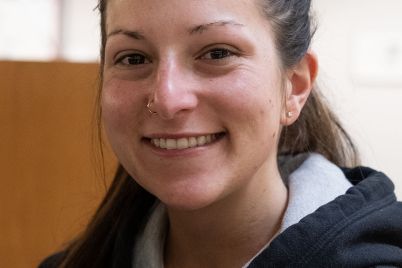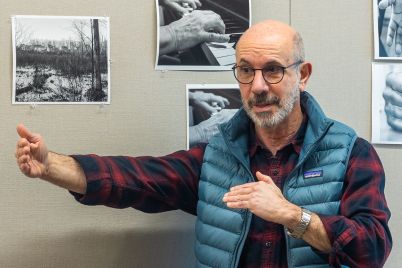
Professor Stauffer specifically requests to teach in person sections of SOC 205 whenever possible.
Zakeria Almajrabi | Washtenaw Voice
Alice McGuire
Deputy Editor
Stefanie Stauffer always wanted to teach at the community college level.
“I think here is a better fit because it’s more of a dialog based format, where people get to share their experiences. And I feel like if peoples’ experiences were much more similar, like in another place, maybe at Eastern or U of M, I don’t think it would be as rich of a class experience.”
Stauffer, an adjunct, is a behavioral science professor who has taught at WCC for nearly a decade now, having started in 2015. She has also been the manager of the Ann Arbor farmer’s market since 2020.
Her favorite class to teach is likely familiar to students who have looked into transferring to the University of Michigan College of Literature, Science, and the Arts–SOC 205: Race and Ethnicity is the only class offered at WCC which fulfills the school’s race and ethnicity requirement.
Starr Burke, the chair of the behavioral sciences department, said “She is teaching the most difficult topic, not only in our department, but maybe across our campus. And she does a fantastic job.” Burke went on to add, “Not everyone could [teach this class] with the sensitivity that she has–that’s the difference she’s made,” while praising Stauffer’s ability to make her students feel comfortable.
When asked how she would sum up social work, Stauffer described the field as being “really diverse,” saying, “I think when people think of social work, they might think of a really specific outcome, like you’re working in a clinical environment with a specific population. And people don’t necessarily see that the broad nature of it is that you can also be doing participant based research as part of it too. Like, the advocacy is woven into the actions.”
Stauffer went on to explain her own particular focus on food justice, saying, “I’ve always been interested in food since a young age, but it wasn’t really until I was in grad school where I got a lot more involved. The social justice part became food justice in a way, but at the same time, for me, it was also a way to connect with my own heritage.”
At the time Stauffer was earning her PhD at the University of California, Santa Barbara, where she took a class with the late Cedric Robinson, the author of “Black Marxism,” who she credits for sparking her interest in the urban agriculture and food justice scenes in Detroit. Soon after, her research evolved to entail observing farmers markets in both California and Michigan in order to try to understand the “space of food access that is unique to a community based market that you’re maybe not getting in a grocery store setting or other ways people procure food.”
When asked what she hopes the average student will get out of taking her classes, Stauffer said, “I really hope that they will have a curiosity about other cultures and other peoples’ backgrounds,” noting the importance of developing empathy in oneself as well as strategies to inspire empathy in others.
“When empathy is lacking, it’s because people don’t see the issue reflecting themselves. They don’t see it impacting their own lives. So if you can bring it back to something that they know directly impacts them, it does bring that empathy out.”


